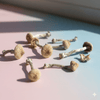When Tracey Tee first heard about microdosing psilocybin, she wasn’t trying to be a rebel. She was a mother, an artist, and someone slipping into burnout.
Her story, recently featured in The Telegraph, captures what many curious, intelligent adults are beginning to wonder: Can mushrooms help us live more balanced, creative, and connected lives?
Burnout
In 2020, like so many others, Tracey hit a wall. Her career was put on pause, her sense of identity blurred into motherhood, and the joy she once felt was replaced by a subtle but growing numbness.
Then came a camping trip near Boulder, Colorado with a few other mums by a peaceful lake - and a small handful of mushrooms.
That night, she laughed, cried, and felt a deep sense of connection she hadn’t experienced in years. “Every eye-rolling cliché happened,” she says. But it also marked the beginning of something real.
The next morning, she knew she’d found something that could change her life.

What Microdosing Actually Means
Microdosing isn’t about hallucinations or escaping reality. It’s about working with a fraction of a full dose (typically between 50 and 200 milligrams of dried mushrooms). Small enough that you don’t “trip,” but large enough to subtly shift perception, mood, and focus.
Tracey began microdosing a few times a week, usually with tea or cacao, pairing it with journaling and walks.
Over time, she noticed herself becoming calmer, more patient, and less reactive, particularly with her daughter. “Mushrooms really soften the edges,” she said. “Suddenly things just clicked into place.”
"Over the past five years since I began microdosing, I’ve adopted a much slower pace of life. I stopped partying and I don’t drink like I used to at all.
"While I’m not trying to be sober, I no longer feel the need to gather with friends and drink on a Saturday night to blow off steam."
The Science
Psilocybin interacts with serotonin receptors in the brain, temporarily increasing neuroplasticity - our brain’s ability to form new connections and break old patterns.
As Dr. Robin Carhart-Harris and researchers at Imperial College London have shown, this “loosening” of rigid thought loops can help people see life with more flexibility and compassion.
For those stuck in cycles of anxiety, depression, or control, it’s like carving a new ski path down a frozen slope.
That’s why microdosing is being explored as a practice that helps people slow down, reflect, and reconnect.

A Movement
Inspired by her transformation, Tracey launched Moms on Mushrooms (MOM). MOM is an online education and community platform that now supports thousands of women exploring psilocybin safely and intentionally.
The goal isn’t to promote careless drug use, but to promote understanding of this powerful tool. “We talk about these things in whispers,” Tracey says, “but the truth is, mushrooms have helped me become a more present, grounded mother.”
Her message is one of curiosity and openness. She assures others that they’re not a bad mum for wanting to feel better.
The Bigger Picture
Psilocybin remains illegal in the UK, but the tide is turning. Studies continue to explore its effects on mood, creativity, and neuroflexibility.
Risks remain - particularly for those with a family history of psychosis or bipolar disorder - and no one should attempt microdosing without proper knowledge, safety, and intention.
Still, the story of Tracey Tee reflects something coming to the collective surface of modern life: a strong yearning for balance and connection.
As she puts it, “I’ve stopped chasing perfection. I just feel… peaceful.”






